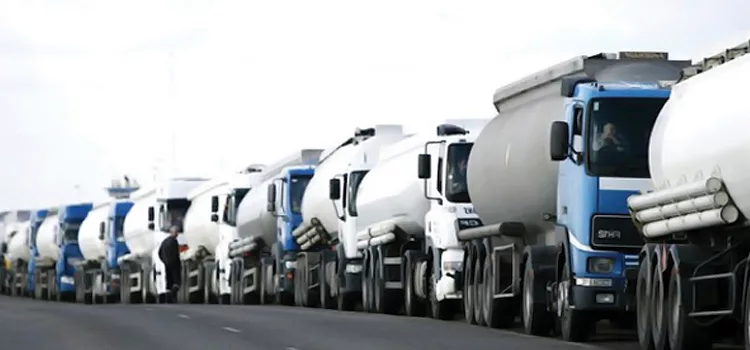The Nigerian Association of Road Transport Owners (NARTO) has vowed to suspend operations on Monday.
National president of the association, Alhaji Yusuf Lawal Othman, made this known in a press statement he issued from Abuja.
Othman said the statement is an official announcement from the association’s headquarters that the members are parking their trucks from Monday due to high operating costs.
He stressed that “Why? Because what we spend on operation is more than what we get in total: both in local and bridging.”
According to him, the members have been operating at a loss and it is no longer sustainable for them to endure the losses.
The NARTO national president said, “We will have to suspend operations from Monday.
“We cannot continue to operate at a loss. Most people have parked. A lot more are going to park.
“But from the point of view of the association itself, we are going to suspend operations on Monday.”
He disclosed that NARTO’s efforts at soliciting the intervention of all the key stakeholders in the federal government and industry have not yielded positive results.
Othman revealed that the association has written letters to table the plight of unbearable cost of operation to the chief of staff to President Bola Ahmed Tinubu; minister of Petroleum Resources; director general, Department of State Services (DSS); Nigerian Midstream and Downstream Regulatory Authority (NMDPRA) chief executive officer; Nigerian National Petroleum Company Limited (NNPC) group chief executive officer; and the marketers.
He stressed that despite the notification to the above stakeholders, “No response.”
Analysing the market situation, which the members have endured for several months, he recalled that the same freight rate that was in force while President Muhammadu Buhari was in government is still subsisting.
According to him, the N32 Lagos to Abuja freight rate that was implemented while the dollar was N650 is still retained now that dollar is N1,615.
He said, “Everybody is aware that all our consumables in terms of operation are not produced in the country.
“So, by virtue of the rate of dollars, every consumable has increased. But the freight they are paying us has been the same even during Buhari’s time.
“So how is that feasible? During Buhari’s time, the dollar was N650. Today, the dollar is now N1,615. The average freight from Lagos to Abuja is N32.”
Continuing, he explained that “What I mean by local, you load Lagos, you discharge in Lagos. And bridging, you load from Lagos, you come to Abuja. Lagos to Lagos, we are paid N120,000.
“AGO alone to distribute fuel within Lagos is N140,000 because it is N1,400 per litre. So, they give you N120,000 and you spend N140,000. So, how do you want to operate? “Talk less about the cost of vehicles, cost of loading, driver’s allowance. That is for local. For bridging Lagos to Abuja, they gave us N32.
“If you have a truck of 40,000 litres, you are talking of N1,280,000-N1,216,000. Less 5% of the amount of N1,280,000 Withholding Tax N64,000. Less 55,000 loading expenses and 15,000 driver allowance. Total expenses N134,000 while balance is N1,146,000. AGO is N1400 for 900 litres, totalling N1260,000.
There is a total loss of N114,000.
The diesel that you use from Lagos to Abuja is 900 litres.
“So when you use 900 litres at 1,400, that will be N1,260,000. So it is by far more than what are paid.
“Meanwhile the cost of a new truck head and tank is N95 million and the used one is N50 million. So imagine the amount invested on each truck?”
We’ve got the edge. Get real-time reports, breaking scoops, and exclusive angles delivered straight to your phone. Don’t settle for stale news. Join LEADERSHIP NEWS on WhatsApp for 24/7 updates →
Join Our WhatsApp Channel










